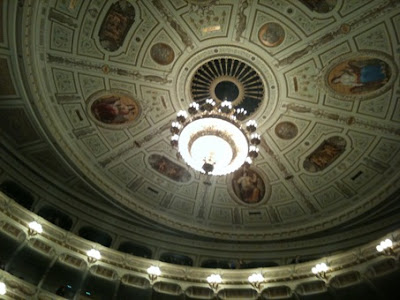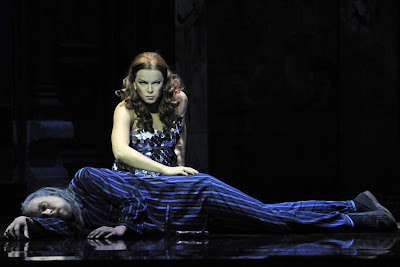Rusalka, Semperoper Dresden, December 14 2010
Conductor ..... Tomáš Netopil
Director ..... Stefan Herheim
Sets designer ..... Heike Scheele
The Princ ..... Zoltán Nyári
The Foreign Princess ..... Marjorie Owens
Rusalka ..... Tatiana Monogarova
Vodnik ..... Georg Zeppenfeld
Ježibaba ..... Tichina Vaughn
Kitchen Boy ..... Tara Erraught
1st Wood Sprite ..... Vanessa Goikoetxea
2nd Wood Sprite ..... Young Hee Kim
3rd Wood Sprite ..... Sofi Lorentzen
Hunter ..... Gerald Hupach
Policeman ..... Friedrich Darge
Butcher ..... Torsten Schäpan
Mr.High ..... Michael Auenmüller
Mr.Low ..... Jun-Seok Bang
Pharmacist ..... Bokyoung Kim
Director ..... Stefan Herheim
Sets designer ..... Heike Scheele
The Princ ..... Zoltán Nyári
The Foreign Princess ..... Marjorie Owens
Rusalka ..... Tatiana Monogarova
Vodnik ..... Georg Zeppenfeld
Ježibaba ..... Tichina Vaughn
Kitchen Boy ..... Tara Erraught
1st Wood Sprite ..... Vanessa Goikoetxea
2nd Wood Sprite ..... Young Hee Kim
3rd Wood Sprite ..... Sofi Lorentzen
Hunter ..... Gerald Hupach
Policeman ..... Friedrich Darge
Butcher ..... Torsten Schäpan
Mr.High ..... Michael Auenmüller
Mr.Low ..... Jun-Seok Bang
Pharmacist ..... Bokyoung Kim
State Opera Choir
Staatskapelle Dresden
Staatskapelle Dresden
Heike Scheele and Stefan Herheim did it again; They produced the most compelling Rusalka of them all: this show is clear, spectacular, surprising, intelligent, entertaining and sends you home with a question or two to think about. To that add a fantastic cast that sounded much better than the one in Munich (which is saying quite a lot), and you get one of those operatic evenings you cannot forget.
First thing first... My trip to Dresden was weird on many levels but it was certainly marked buy the loads of snow that was falling ever more intensely as we were approaching Dresden. In Dresden it turned brutal: a dry dust-like snow was falling in whirls of unpredictable wind. In such conditions you normally stay at home (or a hotel), unless you're a crazy opera freak, such as Yours Truly.
In short, it was impossible to visit the entire theater district in Dresden, which seems to be the place to visit when in town, but to search the shortest path to reach Semperoper -- an impressively large and solid cake-like building that makes quite an impression on you even in such nasty weather.
In the process I forgot to take my camera so the pics below are iPhone-made (which means crappy.)
 |
| Approaching the impressive building of Semperoper in Dresden (blurred pic is more a fault of the show-storm than of my iPhone) |
You should know that this is one of the most prestigious opera houses in Germany (among musical directors in their impressive history, you can see the names of Wagner, Weber, R.Strauss...) The interior is really beautiful and if you like a peculiar German style you'll love it. As I said, the building is huge with plenty of hallways and corridors inside, all carefully decorated with lots of paintings inserted either in the upper parts of the walls or on the ceiling, depicting scenes from various operas (Freischützm, Semiramide, Zauberflöte, Tannhäuser, and many more)
 |
| In the corridors surrounding auditorium you can find a bust of every music director since the creation of Semperoper. This one you should easily recognize. |
The auditorium is very large, again meticulously decorated and bright colored (unfortunately that brightness doesn't show in the following pic)
People speak of its acoustics as extraordinary but I could not verify that point myself as I was seated in the 3rd row [not because I wanted to pay the most expensive seat, but because I decided to go only 2 days before the show and I didn't have any other choice. By the way, the expensive tic is offset by low hotel prices: I found a four star hotel for only 40€/night!]
Back to this show, co-produced by three theaters: La Monnaie in Brussels, Opernhaus in Graz, and Semperoper in Dresden. The show was first time premiered 2 years ago in Brussels (when I was so sorry to have missed it), then a year ago in Graz, and now in Dresden. I do not want to make a presumptuous statement about the cast in Brussels or in Graz, but I wonder if it is at all possible to line up any better cast than this one in Dresden. As the cherry on the cake you get Staatskapelle Dresden --one of the world's best orchestra today-- in the pit. They clearly enjoyed performing this wonderful music under the baton of young Tomas Netopil, who I've never seen before. His incisive conducting perfectly matched with Herheim's dynamics on the stage, and his brilliance only corroborated my statement that the young & talented conductors are the key to make great orchestra sound greater.
In this production the central character is Waterman. Georg Zeppenfeld simply proves that he is the best sounding bass right now. Scenically he seemed absorbed into the character and fully at ease in an otherwise very tricky show to act through. Herheim's shows are always busy and for the main characters that requires lots of physical effort in addition to the work on good timing and scenic precision. Losing your focus you mean breaking your leg. In a long role such as this one that amounts to quite a lot of hard work. [Not surprisingly, there were two intermissions. ] Vocally, Georg is simply stunning: the timbre is beautiful/rich, the voice is healthy in every register, and his singing is powerful and effortless.
The voice of Tatiana Monogarova has grown bigger since the last time I saw her [that was Tatiana in the famous Tcherniakov's production of Eugene Onegin in Paris.] These days her voice sounds close to that of Anna Netrebko's. She took all the necessary risks and hit all the top notes while keeping beautifully sound gravi. Very impressive performance! Brava
Zoltán Nyári, the winner of the Operafestival in Szeged 2009, was The Prince who delivered a riveting performance too. His voice in live sounds beautiful and fresh. He was my biggest surprise actually as he made the trio (Waterman, Rusalka, Prince) sound both homogeneous and glorious. Even if he got a bit tired towards the end of the show, he deserved all the praise he received at the curtain call.
Tichina Vaughn (Jezibaba) and Marjorie Owens (The Foreign Princess) are members of the Semperoper ensemble and they both act and sing wonderfully. [I would love to listen to Marjorie singing Elisabeth (Tannhäuser) - the current state of her particularly beautiful voice sounds perfect for that role.]
 |
As I already mentioned, Herheim decided to build his show around Waterman, who --in this production-- is a man living though his mid-life crisis. Before the first note is played, on the stage we see a typical town square with a bar, subway exit, a church façade and a big tree on the left, while on the right we see Waterman's house, his wife showing up on the balcony, waiting for her husband to come back from work. On the subway exit we see a homeless person begging for some money (Jezibaba). It rains and many men, women and children go across the stage, showing a typical rush hour on one of those gray days.
That scene is then repeated over and over... and over again --to suggest a monotonous and routinely life of this middle aged man-- until Waterman notices a young and seductive prostitute (Rusalka). He feels attracted to her, and that moment sets the wheels of his psyche in action and his whole world starts crumbling. He does not want to go back home but instead goes to the bar where he sees other seductive young women (wood-sprites), which only added to the 'awakening' of his desires and his urge to step out from his routine life. His wife (The Foreign Princess) saw that her husband went to the bar and she angrily pull the curtains over her windows -- a sign which should be like a threat to him and make him rush back home, but then again he sees beautiful Rusalka appear -- who in a scenically astoundingly organized scene appears as a mermaid. Rusalka is unhappy about her life too and dreams of a Prince who would marry her (see pics below to get an idea how Herheim and Scheele make that point come across.)
From that point on, we are in Waterman's mind, in the world of his suppressed desires and his unrealized dreams. He feels trapped in his own marriage. Actually Rusalka reminds him of the girl he once loved and wanted to marry, but who he'd eventually left for another girl who he married (his wife). That was masterfully dramatically recounted through the story about the Prince and the Foreign Princess which in fact is the story about him-young-self and his wife. Did she ever really love him? Did he marry because he was supposed to or because he really wanted to? Why and how he became the man he is today? These and plenty other questions are hidden in a lively action on stage which also includes several new characters - i.e. those who do not appear in the libretto but who fit wonderfully this show. Rusalka, her beauty, her sex-appeal and her 'fragility' are the qualities of a woman of his dream.
Somewhat surprisingly, the story ends tragically: Waterman finally returns to his house, meets his b*chy wife, and during a routine evening in front of TV, he kills her. In the last scene the police arrest Watermen and the emergency staff come to collect the body of his dead wife.
I will not describe the sets that transform several times during the show in a way similar to what happens during Parsifal in Bayreuth. All of you who saw that Parsifal will recognize the same mastery of Heike Scheele's in this show too.
This 'pilgrimage'-worthy production of Rusalka will be back on program in Semperoper next May, so if you can possibly make it and go to Dresden...
Production photos (all © Semperoper):
My lousy iPhone CC-pics:
 |
| Tatiana Monogarova (this white silhouette) |
 |
| and here you don't see Georg Zeppenfeld |
 |
| Tomas Netopil is in the middle and in the right end is Zeppenfeld and Zoltan Nyari |
And finally the trailer:



















Sounds wonderful... is changed much from the La Monnaie 2008 production?
ReplyDeleteWill try to follow your advice and catch it in May: I have never managed to see a Herheim production live, and in full only his Salzburg Entführung (which I have to admit I find somewhat incomprehensible!). But clips from Parsifal, Rosenkavalier, Lohengrin make me think he must be very special!
Oh yes, he is definitely very special, extremely talented plus witty.
ReplyDeleteThat Entführung was a bit of his statement to be the new exponent of deconstructionst current in opera producing. That Entführung has nothing to do with Entführung. The whole point was to create a very clean show that you can figure out easily only if make an effort to forget about Entführung you expect to see.
Since the majority of opera aficionados are a little bit like babies and what to have the same story recounted every night, people came to see the same old stuff, and were unhappy because the Herheim show was completely different. But if you try to see the show as it is, you'll see that it is brilliant ;)
That brings you back to the question how much and if at all the directors can be authorized to modify libretto. I believe in freedom to do what you think is best as long as you have artistic reasons to step outside of boundaries defined by libretto; if you want to bring to light a meaning of an opera that was not explored before... or to simply make it more relatable to our time, our worries, our lives.